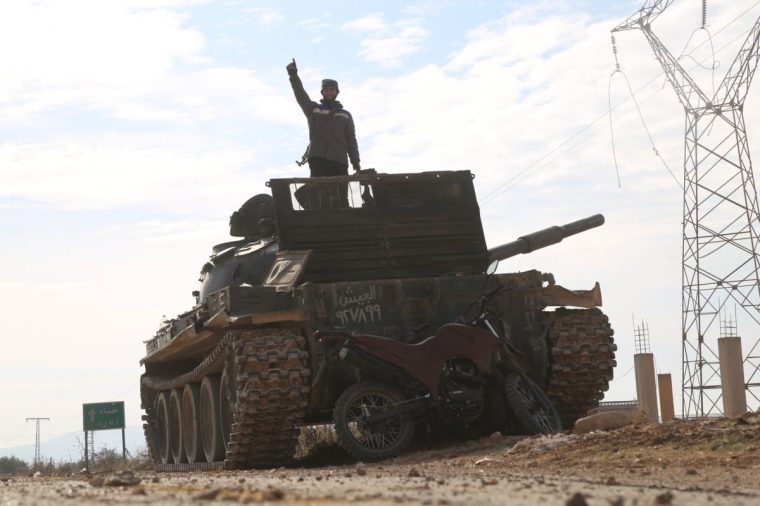The recent unfreezing of Syria’s civil war took many by surprise. Since Hayat Tahrir al-Sham (HTS), the Syrian National Army (SNA), and other armed opposition groups launched their lightning offensive on Aleppo and other parts of Syria beginning on 27 November, there has been a renewed focus on Turkey’s role in the country.
This dramatic rebel advance, formally known as “Operation Deter the Aggression”, has provided Ankara with unique opportunities to pursue its interests at a time in which significant geopolitical shifts are taking place in the Middle East.
These Turkish interests include renormalisation with Syrian President Bashar al-Assad’s regime, a greater sense of security from the Syria-based Kurdistan Workers’ Party (PKK)-affiliated Peoples’ Protection Units (YPG), preservation of the Syrian nation-state’s territorial integrity, and a return of millions of Syrian refugees currently in Turkey back home.
After Russia’s intensified military intervention in Syria began in 2015, Turkey essentially gave up its quest to sponsor regime change there, more or less accepting the reality of Assad staying in power, and choosing to shift its focus toward fighting the YPG.
Throughout this year, Ankara and Damascus engaged in talks on the terms of an agreement to restore official diplomatic ties.

Yet, with Assad’s regime feeling emboldened by Damascus’s reintegration into the Arab League and overall rehabilitation among fellow Arab states, Syria had quite maximalist demands for formal reconciliation with Turkey. Ankara refused to accept such terms, which included a complete end to any Turkish military presence in Syria and Ankara’s support for the Syrian opposition, resulting in the end of diplomatic efforts to renormalise bilateral relations.
The Assad government rebuffing Ankara’s diplomatic overtures aimed at restoring ties between the two countries frustrated Turkey’s leadership.
“Unfortunately, this goodwill gesture from Ankara was misunderstood by Damascus, Russia, and Iran as weakness,” explained Ömer Özkizilcik, a non-resident fellow for the Syria Project in the Atlantic Council’s Middle East programmes, in an interview with The i Paper.
“With that, Turkey understood that Damascus is not interested in any form of peace and has greenlighted this rebel offensive. Now we are where we are,” he added.
At this point, this ongoing offensive may very well strengthen Ankara’s bargaining power, demonstrating to Damascus that Assad’s regime is not in a position to avoid making concessions to Turkey in future renormalisation talks.
“Turkey had started a normalisation process with Assad and he had rejected it, so the current strategy of Turkey, I believe, is just wait and see, and then mediate because it’s the most cost-effective way to resolve the incompatibilities in Syria,” Murat Aslan, an associate professor of international relations at Turkey’s Hasan Kalyoncu University, told The i Paper.
“As Ankara’s local partners gain territory, resources, and strategic leverage over Assad, Ankara’s influence grows with it. Ankara’s offer of a negotiated end to the war in Syria, spurned with disdain by Assad, now might be looking pretty good to him,” said Richard Outzen, a non-resident senior fellow at the Atlantic Council.
The YPG factor
The Turkish policy aimed at thwarting the YPG from establishing what Ankara would see as a terror corridor anywhere along the Turkish-Syrian border is central to what Turkey wants to see as an outcome of “Operation Deter the Aggression”.
There is no doubting that Turkey sees the YPG presence along its border as nothing short of an existential threat. The extent to which the US and other Nato members have supported the YPG in Syria has fueled extremely high levels of tension and distrust between Ankara and its traditional allies in the West.
Now with HTS and Ankara-sponsored rebel groups waging this offensive from Idlib (Syria’s north-western governorate that for many years has been a de facto Turkish protectorate), President Recep Tayyip Erdogan’s government can “take advantage of a tactical situation that allows it to achieve its tactical goal of pushing YPG/PKK out of where it currently is and into the area of Syria away from where there’s a Syrian border with Turkey”, Matthew Bryza, the former US ambassador to Azerbaijan, told The i Paper.
“Ankara’s primary goal in Syria is not influence but ensuring stability, securing its borders, and eliminating threats from terrorist organisations like YPG/PKK and Daesh [Isis],” said Gökhan Ereli, Gulf studies co-ordinator at ORSAM, an Ankara-based think-tank.
Syrian refugees – a hot-button issue in Turkey
Now that rebel forces control Aleppo, Ankara is optimistic about an acceleration of the return of Syrian refugees. If the number of refugees who return to Syria reaches a certain threshold, Özkizilcik believes that the Syrian refugee file could cease to play out in Turkish domestic politics as a major issue.
Mindful of how heated this issue was in Turkey’s presidential election last year, the Turkish president would undoubtedly embrace changes on the ground that create conditions in which a significant percentage of these refugees in Turkey voluntarily choose to return home.
“Hosting over four million Syrian refugees, Turkey has consistently pursued military and political solutions to promote stability, emphasise Syria’s territorial integrity, and facilitate the safe return of displaced persons,” noted Ereli.

Might the offensive go further than Ankara expected?
But what if “Operation Deter the Aggression” is more successful than anticipated? It is less than clear what Ankara might do if the anti-Assad militias manage to topple the Damascus government, rather than just make some advances that enhance Turkey’s bargaining power in talks with Syrian diplomats and push the YPG further away from the Syrian-Turkish border.
“Maybe this does result in the fall of Damascus and Assad, and the Turks may not have planned that far ahead in detail. Especially if there are excesses or atrocities against civilians, Christian communities, or US-aligned YPG forces, costs and risks will rise,” commented Outzen.
There is a risk that the unfreezing of the Syrian civil war will shatter the Syrian nation-state – an outcome that would be at total odds with Ankara’s quest to promote Syria’s stability and help preserve its territorial integrity. Along these lines, given that Turkey ultimately seeks to negotiate a renormalisation of relations with Assad’s government, it is worth asking how that will be possible if Syria lacks any functional central government with the power and authority to make good on whatever concessions that the Syrian regime (or what is left of it) makes to Ankara in future talks.
Another risk pertains to the possibility of the Syrian Arab Army, with support from the Russian military, gaining an upper hand over the rebels. Under such circumstances, there could be new waves of Syrian refugees coming into Turkey, depending on the extent to which Assad and his domestic and foreign allies might prove capable of reversing these rebel gains.
Without doubt, this lightning rebel offensive on Aleppo and other parts of Syria offers Ankara many opportunities to advance its interests across multiple domains. But as the military clashes intensify, there are obviously risks that any actor directly or indirectly involved in an escalating multidimensional conflict must consider.
“Politically, Turkey’s role as a key participant in processes like the Astana talks [involving Turkey, Russia, and Iran] and other international platforms will be essential in addressing the evolving situation. By advocating for stability and a political resolution, Turkey aims to balance its national interests with broader regional peace efforts,” said Ereli.
“Any significant threat to Turkey’s national interests or borders may pose challenges, but Turkey’s response will be swift and resolute, reflecting its steadfast commitment to protecting its sovereignty and security,” asserted the Ankara-based analyst.


